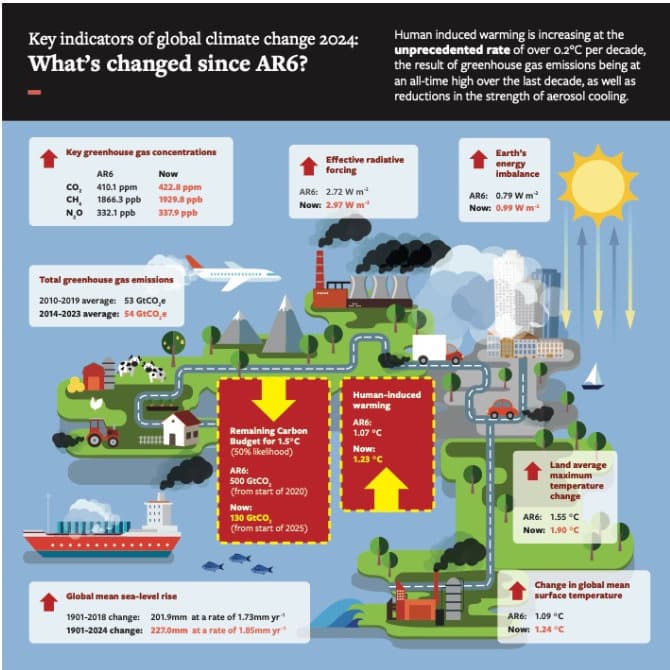Things aren’t just getting worse. They’re getting worse faster, We’re actively moving in the wrong direction in a critical period of time that we would need to meet our most ambitious climate goals. Some reports, there’s a silver lining. I don’t think there really is one in this one.— study co-author Zeke Hausfather
At current emission levels, a 1.5°C global temperature increase will be unavoidable in a little more than three years, and 1.6°C or 1.7°C could be exceeded within nine years.
That’s a key finding of the latest Indicators of Global Climate Change report, released this week. Between 2015-2024 average global temperatures were 1.24°C higher than in pre-industrial times, with 1.22°C caused by human activities, meaning that, essentially, our best estimate is that all of the warming we have seen over the last decade has been human-induced.
The equivalent of around 53 billion tonnes of CO2 (Gt CO2e) has been released into the atmosphere each year over the last decade, primarily from burning fossil fuels and deforestation. In 2024, emissions from international aviation – the sector with the steepest drop in emissions during the pandemic – also returned to pre-pandemic levels.
Surplus heat, accumulating in the Earth system at an accelerating rate, is driving changes in every component of the climate system. The rate of global heating seen between 2012 and 2024 has about doubled from the levels seen in the 1970s and 1980s, leading to detrimental changes of vital components, including sea level rise, ocean warming, ice loss, and permafrost thawing.
The ocean is storing about 91% of this excess heat driven by greenhouse gas emissions, which leads to ocean warming. Warmer waters lead to rising sea levels and intensified weather extremes, and can have devastating impacts on marine ecosystems and the communities that rely on them. In 2024, the ocean reached record values globally.
Between 2019 and 2024, global mean sea level increased by around 26 mm, more than doubling the long-term rate of 1.8 mm per year seen since the turn of the twentieth century. Sea-level rise in response to climate change is relatively slow, so we have already locked in further increases in the coming years and decades.
Other key findings:

(Materials provided by the University of Leeds)

